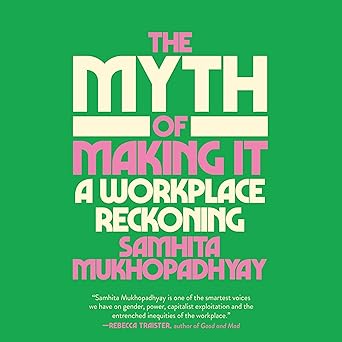
We've all been there - climbing the corporate ladder, working long hours, and sacrificing our personal lives for the sake of success. But what happens when we finally reach the top, only to realize that our success comes with a hefty cost? Samhita Mukhopadhyay, former executive editor of Teen Vogue, shares her personal story of workplace reckoning and argues for collective responsibility to reimagine work as we know it.
As we navigate our professional lives, we're often taught that success is a solo effort, that we need to push ourselves to the limit to achieve our goals. But is this really the case? Mukhopadhyay takes us on a journey from the 1960s to the present, tracing the origins of these myths and exploring the impact they have on our lives and workplaces. Through her own experiences, as well as those of activists, experts, and workers, Mukhopadhyay reveals how these myths of success can be destructive, leading to burnout, inequality, and exploitation. By sharing her story and highlighting the struggles of others, Mukhopadhyay makes a powerful case for a more equitable and just workplace culture. One that values fairness, recognizes individual worth, and empowers workers to thrive.
As we ponder the concept of success, Mukhopadhyay challenges us to consider what would happen if we reimagined work as a fundamental aspect of human fulfillment. What does a liberated workplace look like? How can we create a culture that prioritizes people over profits, that recognizes the value of care work, and that provides a living wage for all? Mukhopadhyay's vision is a call to action, a guide for those of us tired of the oppressive grip of hustle culture. Her book is a testament to the power of collective responsibility and our individual capacity to create change.
I just finished reading this book and I couldn't help but feel a sense of empathy for the author, Samhita Mukhopadhyay, as she shares her personal story of struggling with the cost of success. As someone who has dedicated their life to helping others find their purpose, I can relate to the pressure of feeling like I'm failing if I don't reach certain milestones. But what struck me most was how Mukhopadhyay's experiences mirrored those of thousands of others in the workplace. The way she points out the destructive nature of our current work culture, where success is often seen as a zero-sum game, resonated deeply with me.
As Mukhopadhyay takes us on a journey from the 1960s to the present, she reveals a disturbing pattern of myths about success that have been perpetuated for decades. She argues that we've been taught to believe that individual success is the ultimate goal, that it's a solo effort, and that we need to push ourselves to the limit to achieve it. But Mukhopadhyay's story, and the stories of others she shares, reveal a more nuanced truth. Our work is not just about achieving success, but about nurturing our humanity, valuing care and compassion, and working towards a more just and equitable society.
As I finished the book, I couldn't help but feel a sense of hope. Mukhopadhyay's vision of a liberated workplace, where people are valued over profits, resonated deeply with me. It's a vision that I believe we all need to strive for, especially in these times when workers are feeling more exploited than ever. By sharing her story and highlighting the struggles of others, Mukhopadhyay makes a powerful case for collective responsibility and the power of individual change. I left the book feeling inspired to think differently about my own work, and to imagine a future where success is no longer a destination, but a journey of growth and fulfillment.
Rating: 0.0 / 5.0
I recently finished reading a powerful book about the true cost of success, and I must say it left a significant impact on me. The author, Samhita Mukhopadhyay, shares her personal story of navigating the corporate world and discovering the dark side of success. She makes a compelling case for reimagining work as a fundamental aspect of human fulfillment. As I turned the pages, I couldn't help but think of the countless people who have suffered in silence, trapped in a cycle of burnout, inequality, and exploitation. The author's vision of a liberated workplace, where people are valued over profits, is a beacon of hope in a world that often prioritizes greed over human worth. I found myself drawn into Mukhopadhyay's narrative, which weaves together the threads of individual and collective struggle, ultimately outlining a path towards a more just and equitable society. The book is a testament to the power of collective responsibility and our individual capacity to create change, and it leaves you feeling inspired to rethink your own relationship with work.